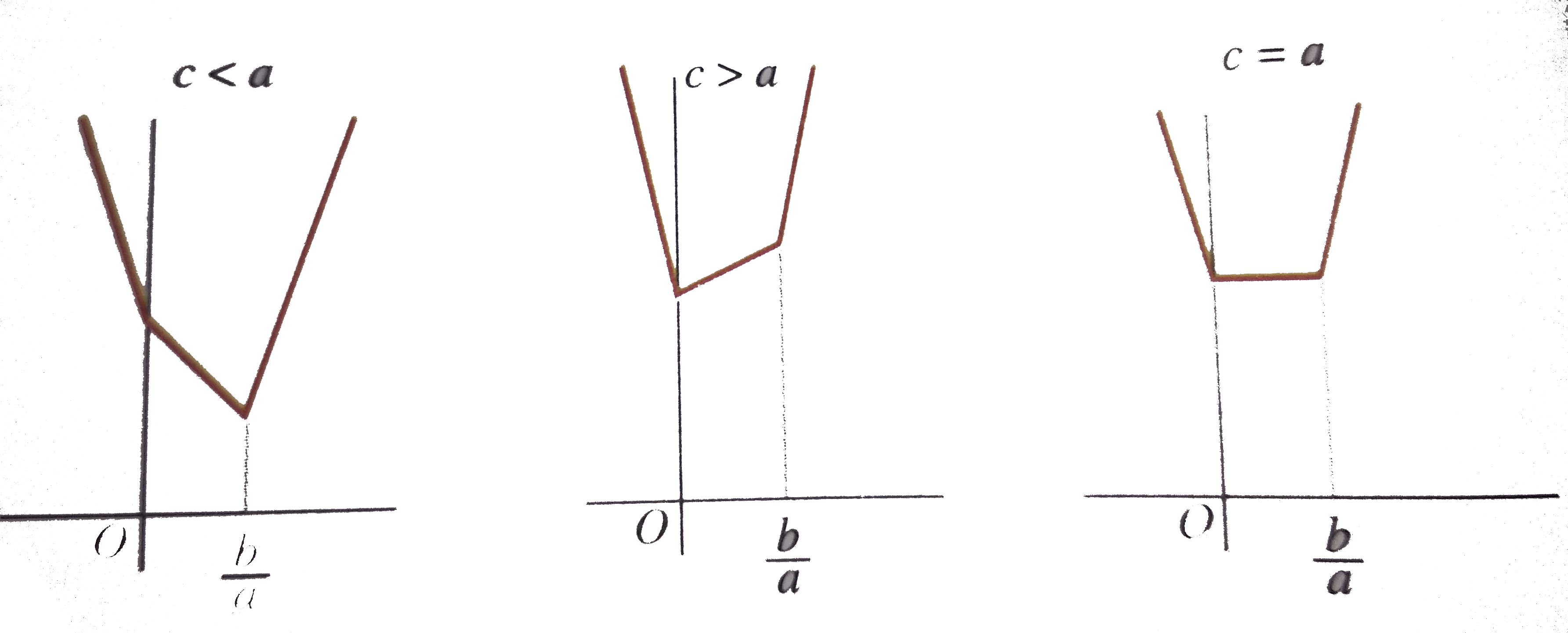f(x)=|ax−b|+c|x|∀x∈(−∞,∞), where a>0,b>0,c>0. Find the condition if f(x) attains the minimum value only at one point.Solution in Bengali
f(x)=⎧⎪
⎪⎨⎪
⎪⎩b−ax−cx,x<0b−ax+cx,0≤x<baax−b+cx,x≥ba
=⎧⎪
⎪⎨⎪
⎪⎩b−(a+c)x,x<0b+(c−a)x,0≤x<ba(a+c)x−b,x≥ba
The graphs of the function for different situations are as shown in the following figures.

From the figure, we can see that for c<aandc>a, there is only point of minima.
For c=a, there are infinite points of minima.
Thus, for exactly one point of minima, c≠a.
Topper's Solved these Questions
- GRAPHS OF ELEMENTARY FUNCTIONS BOOK - CENGAGE PUBLICATIONCHAPTER - GRAPHS OF ELEMENTARY FUNCTIONS EXERCISE - EXERCISES
34 Videos
- GRAPHS OF POLYNOMIAL AND RATIONAL FUNCTIONSBOOK - CENGAGE PUBLICATIONCHAPTER - GRAPHS OF POLYNOMIAL AND RATIONAL FUNCTIONSEXERCISE - Exercises
17 Videos
- GRAPHS OF TRIGONOMETRIC FUNCTIONSBOOK - CENGAGE PUBLICATIONCHAPTER - GRAPHS OF TRIGONOMETRIC FUNCTIONSEXERCISE - Exercises
22 Videos
Similar Questions
Draw the graph of y=1(1/x).
View SolutionDraw the graph of y=(x−1)(x2−x+1).
View SolutionDraw the graph of y= cosec 2x−cot2x. Is f(x) periodic ? If yes, what is its fundamental period ?
View SolutionThe set of points where the function f(x)=x|x| is differentiable is (−∞,∞) (b) (−∞,0)∪(0,∞) (0,∞) (d) [0,∞)
View Solutionf(x)=|ax−b|+c|x|∀x∈(−∞,∞), where a>0,b>0,c>0. Find the condition if f(x) attains the minimum value only at one point.
View SolutionConsider the function f:(−∞,∞)−−−−−→−∞,∞ defined by f(x)=x2+ax2+a,a>0, which of the following is not true? maximum value of f is not attained even though f is bounded. f(x) is increasing on (0,∞) and has minimum at ,=0 f(x) is decreasing on (−∞,0) and has minimum at x=0. f(x) is increasing on (−∞,∞) and has neither a local maximum nor a local minimum at x=0.
View SolutionThe range of the function f(x)=|x−1| is
A. (−∞,0)
B. [0,∞)
C. (0,∞)
D. R
View SolutionThe set of points where the function f(x)=x|x| is differentiable is (a) (−∞, ∞) (b) (−∞, 0)∪(0, ∞) (c) (0, ∞) (d) [0, ∞]
View SolutionLet f(x)<0∀x∈(−∞,0)andf(x)>0∀x∈(0,∞) also f(0)=0, Again f'(x)<0∀x∈(−∞,−1)andf'(x)>∀x∈(−1,∞) also f'(−1)=0 given limx→∞f(x)=0andlimx→∞f(x)=∞ and function is twice differentiable.
The minimum number of points where f'(x) is zero is:
View Solutionf(x)=|ax−b|+c|x|∀x∈(−∞,∞), where a>0,b>0,c>0. Find the condition if f(x) attains the minimum value only at one point.
View SolutionAn LR circuit with a battery connected at t =0. Which of the following quantities will be zero just after the connection?
View Solutionf(x)=|ax−b|+c|x|∀x∈(−∞,∞), where a>0,b>0,c>0. Find the condition if f(x) attains the minimum value only at one point.
View SolutionThe set of points where the function f(x)=x|x| is differentiable is (−∞,∞) (b) (−∞,0)∪(0,∞) (0,∞) (d) [0,∞)
View SolutionThe range of the function f(x)=|x−1| is
A. (−∞,0)
B. [0,∞)
C. (0,∞)
D. R
View SolutionThe set of points where the function f(x)=x|x| is differentiable is (a) (−∞, ∞) (b) (−∞, 0)∪(0, ∞) (c) (0, ∞) (d) [0, ∞]
View SolutionThe domain of the function f(x)=1√|x|−x is:
(A) (−∞,∞)
(B) (0,∞
(C) (−∞,0)
(D) (−∞,∞)-{0}
View Solution
